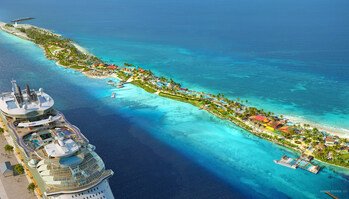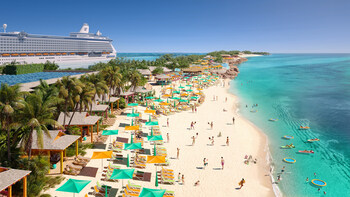NASSAU, BAHAMAS — Royal Caribbean yesterday outlined its environmental plans for its beach club development at Paradise Island, which it claims will be a 100 percent renewable energy development by the year 2030.
The company said in a statement yesterday that the six key components of its environmental plan for the beach club development are zero waste-to-landfill, renewable energy, wastewater treatment, protecting and enhancing the surrounding habitats, and environmental monitoring. The company noted that the development will contribute zero waste to the New providence landfill.
“The beach club will be free of single-use plastics and offer compostable service ware at food and beverage venues. In addition, it will be equipped with bio-digesters to reduce food and other organic waste, and process cooking oil into biodiesel for energy production. The cruise line will also develop partnerships with local Bahamian companies focused on recycling and innovative waste reduction programs,” the company indicated.
“Royal Caribbean is committed to a net-zero carbon footprint for the Royal Beach Club by 2030. The project will incorporate smart design considerations during construction, including natural shade, low flow filters and more. The line will also invest in renewable green energy production – solar, wind and hydro – both onsite and through innovative, new partnerships throughout New Providence.”

The company also dismissed suggestions that the development would require dredging and incorporate overwater cabanas, stating that Royal Caribbean has “no marine development plans” for the northern shore where abundant coralis present.
It also plans to “minimize the impact on marine life through monitoring and adjusting the location of the limited structures, such as the floating pier, in place during construction on the southern shore of the island.”
According to Royal Caribbean, the beach club will also utilize what it described as the “best-in-class” wastewater treatment that will process 100 percent of the wastewater generated onsite. More than 95 percent of the treated wastewater is intended for beneficial reuse, and the remaining byproduct will be composted for landscaping and vegetation, the company pledged.
The company also pledged to the island’s habitat noting that the western end of Paradise Island has over the years fallen into disrepair, with several former residential properties neglected or abandoned.

“The company will restore this area by adding native plants and vegetation, removing invasive, non-native species of plants and only constructing buildings on previously altered property or that contains significant invasive or non-native species of plants. In addition, Royal Caribbean plans to continuously study and protect wildlife during construction and eventual operation,” RCI said.
It also noted that when building and operating the beach club, a Bahamian company will conduct environmental monitoring and publicly report information through an environmental scorecard.
The company stated that it will hold a supplemental public hearing regarding the project in conjunction with The Bahamas’ Department of Environmental Planning and Protection.
“Details for the meeting are being finalized with the government of The Bahamas and will be shared as soon as they are available, in line with notice requirements. The cruise line will also share more about its environmental plans in the coming weeks. Now that the beach club has received the government’s conditional approval, this information will include answers to questions various stakeholders submitted during the initial public consultation in September 2021,” RCI said.






